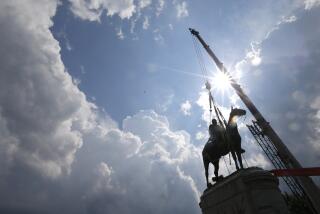Virginia’s Schools Take Their Honor Seriously
- Share via
Honor codes have always been serious matters in tradition-laden old Virginia schools such as VMI--an institution that produced Gen. George C. Marshall, whose faculty once included legendary Confederate Gen. Thomas Jonathan (Stonewall) Jackson, and whose teen cadets charged Yankee bayonets at the Civil War battle of New Market.
At Washington and Lee University, students are guided by an honor system installed by Robert E. Lee 129 years ago. They are introduced to the code in the chapel where Lee worshiped and where his remains lie.
At the College of William & Mary, where young men of the Colonial planter aristocracy first adopted a code forbidding cheating at cards and disrespect of women, freshmen meet at the Christopher Wren Building, America’s oldest academic hall, to accept the pledge.
At the University of Virginia, new students gather on the lawn before Thomas Jefferson’s Rotunda each autumn. In a candlelight ceremony, each uses a quill pen to sign a parchment pledging to abide by the school’s code.
UV’s student-designed and student-administered code, probably the best known in the country, has been a subject of debate off and on for generations.
Created in the wake of a student’s fatal shooting of a faculty member in 1842, the code has been modified by student votes over the years and has weathered several crises. It was ridiculed--and changed--when a student was expelled for taking a soft drink from a vending machine without payment. It has withstood a challenge in federal court and survived a divisive fight during an attempt to impeach the honor committee president, its only black member.
There have been at least 10 unsuccessful efforts to shed its tough requirement to expel any student convicted of a code violation. The last, ending with a referendum last month, was troublesome because the debate came to be drawn along racial lines.
In the background was a cheating conviction of an African American student by a student jury that included only one black member. The open trial came after the accused was to have graduated. The conviction nevertheless blocked her degree and prevented her from going to Duke University Law School.
With the backing of African American organizations on campus, students were offered a proposal to allow honor court juries to impose temporary suspension instead of expulsion. It was a way, advocates argued, to provide some sanction for offenses not serious enough to warrant expulsion.
“There is a lot of cheating in this university,” said Kimberly Warden, one of the authors of the proposal, “and students know that it goes on. . . . But they don’t file charges because they don’t want to see people expelled.”
More to Read
Sign up for Essential California
The most important California stories and recommendations in your inbox every morning.
You may occasionally receive promotional content from the Los Angeles Times.













